Books

Ripensare la smart city.
Francesca Bria and Evgeny Morozov 2019Codice Edizioni
Rethinking the Smart City is a policy report about how cities can regain democratic control over technology, data, and infrastructure, but also over the services that are mediated by smart technologies—such as utilities, transportation, education, and health. We provide a wealth of examples and case studies from across the globe, and discuss alternative smart city models, which rely on democratic data ownership regimes, grassroots innovation, and cooperative service provision models.
More info >
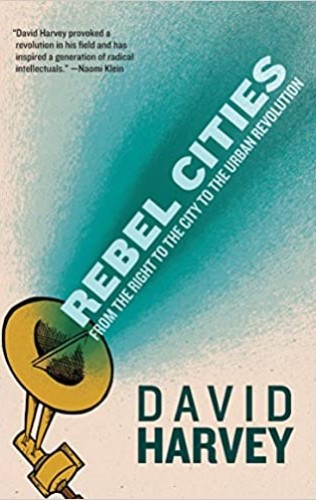
Rebel Cities: From the Right to the City to the Urban Revolution.
David Harvey2012
London: Verso
Rebel Cities places the city at the heart of both capital and class struggles, looking at locations ranging from Johannesburg to Mumbai, and from New York City to São Paulo. Drawing on the Paris Commune as well as Occupy Wall Street and the London Riots, Harvey asks how cities might be reorganized in more socially just and ecologically sane ways—and how they can become the focus for anti-capitalist resistance.
More info >
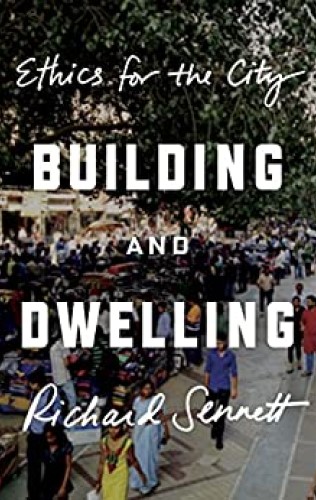
Building and Dwelling: Ethics for the City.
Richard Sennet2018
London: Allen Lane
Building and Dwelling is the definitive statement on cities by the renowned public intellectual Richard Sennett. In this sweeping work, he traces the anguished relation between how cities are built and how people live in them, from ancient Athens to twenty-first-century Shanghai. He shows how Paris, Barcelona, and New York City assumed their modern forms; rethinks the reputations of Jane Jacobs, Lewis Mumford, and others; and takes us on a tour of emblematic contemporary locations, from the backstreets of Medellín, Colombia, to the Google headquarters in Manhattan.
More info >
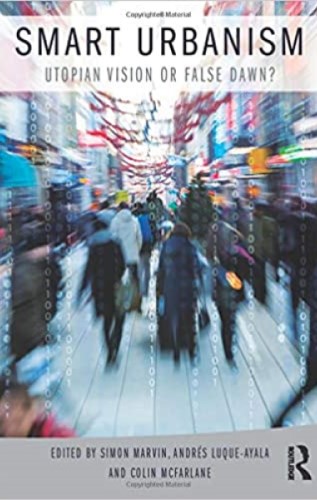
Smart Urbanism Utopian vision or false dawn?
Simon Marvin, Andrés Luque-Ayala, Colin McFarlane2015
Routledge
Smart Urbanism (SU) - the rebuilding of cities through the integration of digital technologies with buildings, neighbourhoods, networked infrastructures and people - is being represented as a unique emerging 'solution' to the majority of problems faced by cities today. SU discourses, enacted by technology companies, national governments and supranational agencies alike, claim a supremacy of urban digital technologies for managing and controlling infrastructures, achieving greater effectiveness in managing service demand and reducing carbon emissions, developing greater social interaction and community networks, providing new services around health and social care etc. Smart urbanism is being represented as the response to almost every facet of the contemporary urban question.
More info >
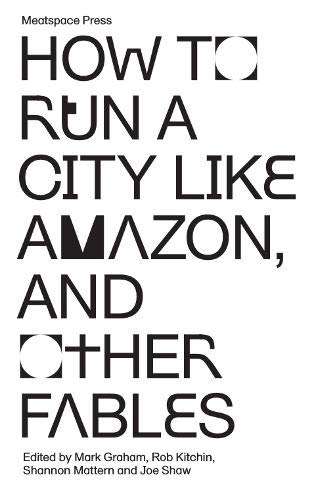
How to Run a City Like Amazon, and Other Fables.
Mark Graham, Rob Kitchin, Shannon Mattern, Joe Shaw2019
London, United Kingdom: Meatspace Press.
The stories and essays in How to Run a City Like Amazon, and Other Fables, explore how a city might look, feel and function if the business models, practices and technologies of 38 different companies were applied to the running of cities. What would it be like to live in a city administered using the business model of Amazon (or Apple, IKEA, Pornhub, Spotify, Tinder, Uber, etc.) or a city where critical public services are delivered by these companies?
More info >
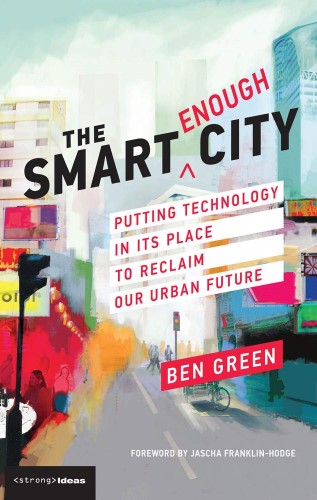
The Smart Enough City: Putting Technology in Its Place to Reclaim Our Urban Future.
Ben Green2019
MIT Press
Why technology is not an end in itself, and how cities can be "smart enough," using technology to promote democracy and equity. Smart cities, where technology is used to solve every problem, are hailed as futuristic urban utopias. We are promised that apps, algorithms, and artificial intelligence will relieve congestion, restore democracy, prevent crime, and improve public services.
More info >
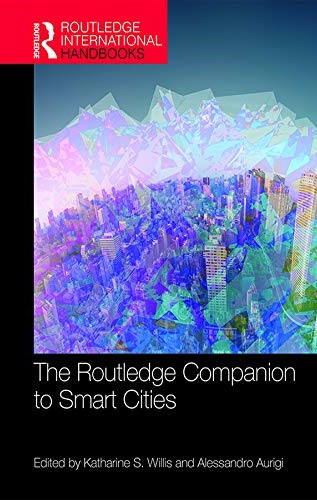
The Routledge Companion to Smart Cities.
Katharine S. Willis, Alessandro Aurigi2020
Routledge International Handbooks
The Routledge Companion to Smart Cities explores the question of what it means for a city to be ‘smart’, raises some of the tensions emerging in smart city developments and considers the implications for future ways of inhabiting and understanding the urban condition. The volume draws together a critical and cross-disciplinary overview of the emerging topic of smart cities and explores it from a range of theoretical and empirical viewpoints.
More info >

Inside Smart Cities: Place, Politics and Urban Innovation.
Andrew Karvonen, Federico Cugurullo, Federico Caprotti2018
Routledge International Handbooks
Inside Smart Cities provides real-world evidence on how local authorities, small and medium enterprises, corporations, utility providers and civil society groups are creating smart cities at the neighbourhood, city and regional scales. Twenty three empirically detailed case studies from the Global North and South - ranging from Cape Town, Stockholm and Abu Dhabi to Philadelphia.
More info >

The Responsive City: Engaging Communities Through Data-Smart Governance.
Stephen Goldsmith, Susan Crawford2018
Wiley US.
The Responsive City is a guide to civic engagement and governance in the digital age that will help leaders link important breakthroughs in technology and data analytics with age-old lessons of small-group community input to create more agile, competitive, and economically resilient cities.
More info >

Smart Cities: Big Data, Civic Hackers, and the Quest for a New Utopia.
Anthony M. Townsend2014
Norton paperback
From Beijing to Boston, cities are deploying smart technology—sensors embedded in streets and subways, Wi-Fi broadcast airports and green spaces—to address the basic challenges faced by massive, interconnected metropolitan centers. In Smart Cities, Anthony M. Townsend documents this emerging futuristic landscape while considering the motivations, aspirations, and shortcomings of the key actors—entrepreneurs, mayors, philanthropists, and software developers—at work in shaping the new urban frontier.
More info >
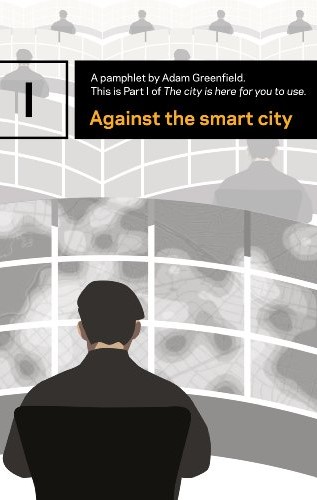
Against the smart city (The city is here for you to use).
Adam Greenfield2013
Norton paperback
In this pamphlet, Everyware author Adam Greenfield explores the ways in which this discourse treats the city as an abstraction, misunderstands (or even undermines) the processes that truly do generate meaning and value — and winds up making many of the same blunders that doomed the High Modernist urban planning of the twentieth century. “Against the smart city” provides an intellectual toolkit for those of us interested in resisting this sterile and unappealing vision, and lays important groundwork for the far more fruitful alternatives to come.
More info >
Reports & Toolkits

Rethinking the Smart City:
Democratizing Urban Technology
Francesca Bria and Evgeny Morozov
2018Rosa Luxemburg Stiftung, New York, NY.
View >





Academic Articles
Charnock, G., March, H., & Ribera-Fumaz, R. (2019). From smart to rebel city? Worlding, provincialising and the Barcelona Model. Urban Studies.Shaw, Joe, and Mark Graham. " An informational right to the city? Code, content, control, and the urbanization of information." Antipode 49.4 (2017): 907-927.
Sennett, R., 2012. No one likes a city that's too smart. In: The Guardian, Available at: https://www.theguardian.com/commentisfree/2012/dec/04/smart-city-rio-songdo-masdar.
Moisio, S., & Rossi, U. (2019). The start-up state: Governing urbanised capitalism. Environment and Planning A: Economy and Space. https://doi.org/10.1177/0308518X19879168
Uyarra, Elvira, et al. "Public procurement, innovation and industrial policy: Rationales, roles, capabilities and implementation." Research Policy 49.1 (2020): 103844.
Developing a critical understanding of smart urbanism. Handbook of Urban Geography. Edward Elgar Publishing, 2019.
Datta, A (2018) The digital turn in postcolonial urbanism: Smart citizenship in the making of India’s 100 smart cities. Transactions of the Institute of British Geographers, 43(3): 405–419.